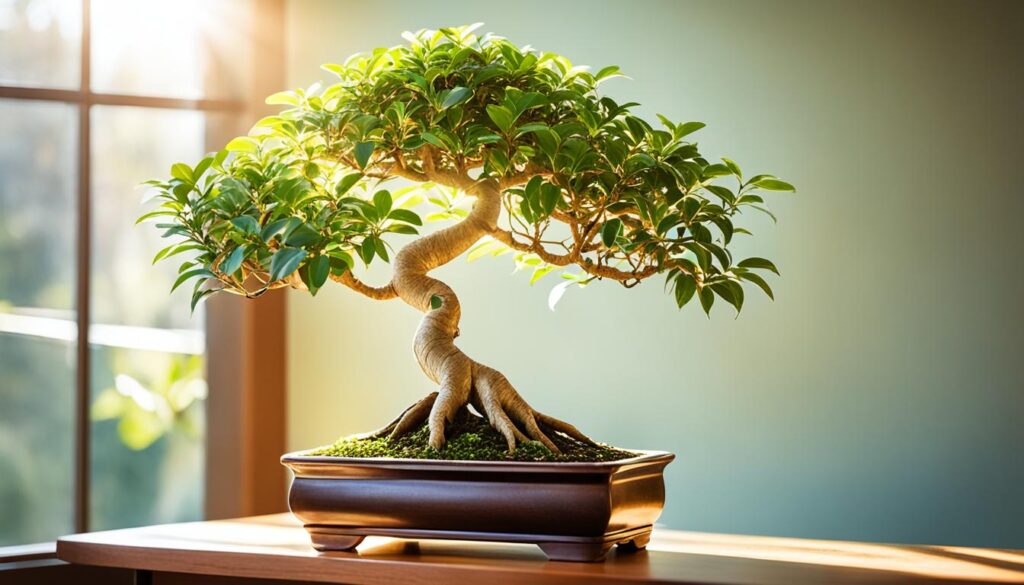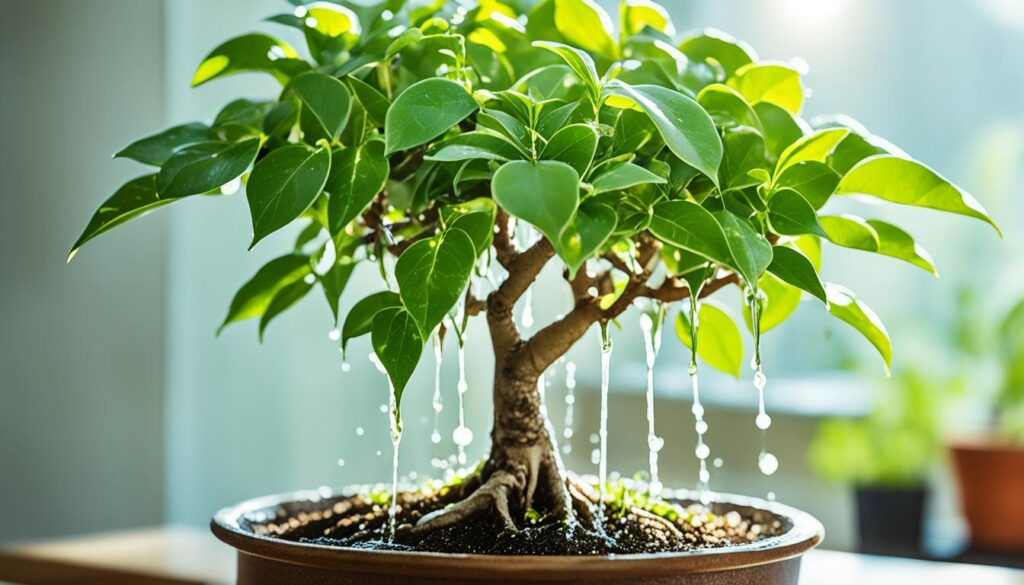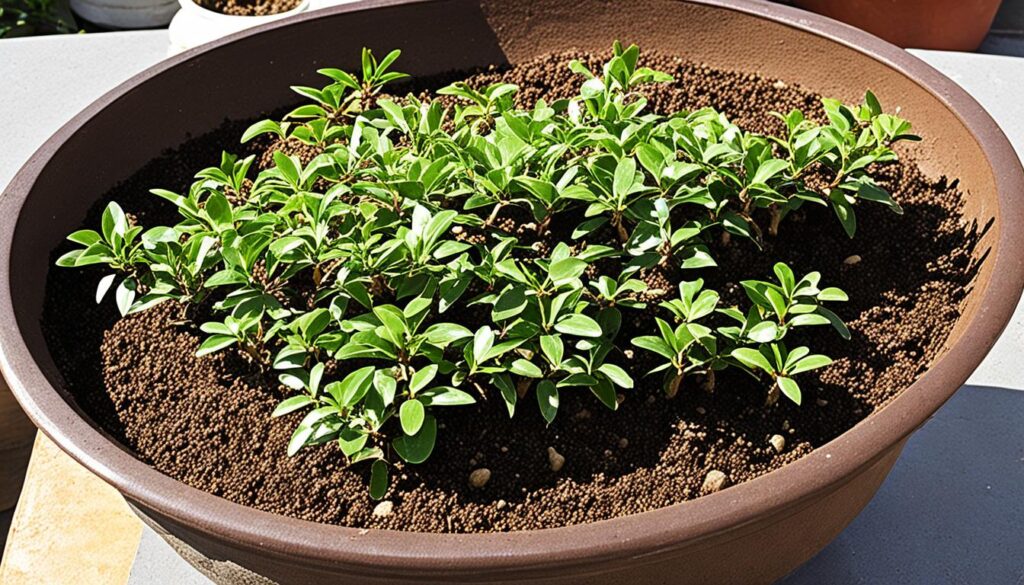If you want a beautiful bonsai ficus, you’ve come to the right spot. This guide will give you key tips for keeping your ficus bonsai healthy. It’s great for both newbies and experts. Knowing how to care for your ficus bonsai is key for its growth and beautiful leaves.
A bonsai ficus makes a great addition to any space. But, it needs the right care for light, water, and trimming. You’ll learn about the best lighting, watering, soil, and pest control in the next sections. Get ready to improve your bonsai skills and make your ficus bonsai even more stunning!
Understanding the Bonsai Ficus
If you’re starting with bonsai, learning about the bonsai ficus is key. A bonsai ficus is a small tree grown in a pot. It’s part of the bonsai art that makes nature look tiny. This type of bonsai is great for many people because it can live in different places.
What is a Bonsai Ficus?
A bonsai ficus is a special kind of ficus tree used in bonsai. The ginseng ficus (Ficus retusa) is a well-known type. It’s known for its aerial roots and can live indoors, making it perfect for city living.
It’s a great first bonsai for beginners. It teaches important lessons about taking care of trees and making them look beautiful.
History and Origin of Ficus Trees
Ficus trees come from ancient China, where they were part of “penjing” art. They moved to Japan during the Kamakura period and became what we know as bonsai today. People love them because they’re easy to care for and look great.
The story of these trees from their beginnings to being top bonsai species shows how versatile and charming they are.
| Aspect | Details |
|---|---|
| Ficus Species | Ginseng Ficus (Ficus retusa) |
| Origin | Ancient China, later refined in Japan |
| Key Features | Aerial roots, adaptability, ease of care |
| Popularity | Common among bonsai enthusiasts of all levels |
Bonsai Ficus Care Essentials

Caring for your Ficus bonsai means knowing what it needs. This includes the right lighting and humidity levels. These are key for its growth and health. Giving your bonsai the right care will make it live longer and stay healthy.
Optimal Lighting Conditions
Ficus bonsai loves bright, indirect sunlight for 6 to 8 hours a day. Place it near a window for the best effect. If you don’t get enough natural light, grow lights can help.
Good lighting helps with photosynthesis. This makes the leaves grow well and the tree strong.
Humidity and Temperature Preferences
Humidity is also key for ficus bonsai. They do well in warm, humid places like kitchens and bathrooms. Keep the humidity at 50-70% for healthy growth.
Also, keep the temperature between 60°F and 75°F. This prevents stress. Avoid sudden temperature changes and drafts.
For more info on bonsai trees like ficus and their care, check out this resource. Knowing what your bonsai needs helps you care for it better.
| Care Aspect | Optimal Requirement |
|---|---|
| Light | Bright, indirect sunlight for 6-8 hours |
| Humidity | 50-70% |
| Temperature | 60°F – 75°F |
Proper Watering Techniques for Your Ficus Bonsai

Getting the watering right is key for your ficus bonsai’s health. A good watering plan helps it grow and stay strong. It stops problems like root rot and leaf color issues. Knowing when to water and spotting underwatering or overwatering signs is vital.
Watering Schedule for Healthy Growth
Water your ficus bonsai when the top soil feels dry. Adjust how often you water based on the humidity and temperature. In hot weather, you’ll need to water more often. Here’s a basic schedule:
| Conditions | Watering Frequency |
|---|---|
| High humidity | Every 2-3 days |
| Normal humidity | Every 5-7 days |
| Low humidity | Every 2-4 days |
Make sure the soil gets moist when you water, but don’t let it get too wet. Too much water can cause root rot, a big problem that might need fixing.
Signs of Underwatering and Overwatering
Spotting underwatering signs early can help your plant. Watch for these signs:
- Wilting leaves
- Dropping leaves
- Dry and brittle stems
Yellow leaves mean you’re watering too much. Other signs of overwatering include:
- Root rot or fungal issues
- Soft, mushy roots
- White or black spots on leaves
Check the soil’s moisture often to make sure you’re watering right. Paying attention to this can help your bonsai thrive.
Choosing the Right Soil for Your Ficus Bonsai

Choosing the right soil for your Ginseng ficus bonsai is key to its health and growth. The ficus bonsai soil must give nutrition, good drainage, and moisture. It should have a mix of organic stuff and small rocks to help the roots breathe and keep water out.
Components of Ideal Ficus Bonsai Soil Mix
The best ideal soil mix for bonsai has about 60% small rocks like lava or pumice, and 40% organic stuff like pine bark. This mix lets the roots breathe and drain well, which is good for their health. Here are the main parts you should use:
- Lava Rock: Great for draining and aeration.
- Pine Bark: Gives organic nutrients and keeps moisture in.
- Akadama: A clay-like soil that holds moisture and nutrients well.
pH Levels and Drainage Requirements
Good drainage is key to stop root rot from too much water. Make sure the soil’s pH is between 6.0 and 7.0, which is neutral to slightly acidic. Repot your bonsai every other year in summer to refresh the soil and nutrients. Also, your pot should have holes for water to drain out.
With a balanced soil mix, your Ginseng ficus bonsai will thrive. The right soil helps it live longer and stay healthy. For more tips on caring for your bonsai, see this comprehensive guide.
Ficus Bonsai Pruning Techniques
Pruning is key for keeping your ficus bonsai healthy and looking great. Using ficus bonsai pruning techniques helps new growth and shapes the tree. Prune when leaves get too dense. Cut back to two leaves after six to eight new leaves appear. This helps growth and keeps your tree looking good.
When and How to Prune Your Ficus Bonsai
Watch your bonsai for signs it needs pruning. Late spring or early summer is best for pruning ficus bonsai. Remove dead or unhealthy branches and those growing inward. Make clean cuts to reduce stress and disease risk.
Tools Required for Effective Pruning
Choosing the right tools is key to successful ficus bonsai pruning. Here are the must-haves:
- Sharp scissors
- Bonsai shears
- Cut paste for sealing wounds
These tools for bonsai pruning ensure clean cuts and protect your tree. Cut paste on severe wounds helps prevent infections, aiding in recovery.
For more on plant care and maintenance, check out this plant growing guide.
Common Pests and Diseases in Bonsai Ficus
Keeping your bonsai ficus healthy means watching for common bonsai pests and diseases. Spotting problems early helps you act fast. Look for pests like aphids, spider mites, and mealybugs often.
Identifying Common Pests
As a bonsai owner, know the signs of pests in bonsai ficus. Watch for these signs:
- Sticky leaves from pests’ honeydew.
- Insects on leaf undersides and stems.
- Leaves turning brown or falling off.
Spotting pests early stops big problems. It also helps in treating ficus bonsai diseases well.
Treatment Options to Maintain Health
For common bonsai pests, you have many ways to treat them. Neem oil and insecticidal soaps work well. Spray these on your bonsai to get rid of pests safely.
Also, make sure you water your bonsai right to avoid diseases like root rot. Too much water can cause root issues and spots on leaves. Changing how you water can help your bonsai fight pests and diseases better.
Best Ficus Bonsai Species for Beginners
Starting with bonsai gardening means picking the right species is key. The Ginseng ficus is perfect for beginners. It’s tough and easy to care for, making it great for new gardeners. Its unique roots and green leaves make your space look beautiful and help you feel proud of your bonsai skills.
Other good choices for beginners are Ficus microcarpa and Ficus benjamina. These trees do well indoors and can handle being forgotten sometimes. This makes bonsai gardening fun without the stress of hard care.
Picking bonsai trees that are easy to care for is important. With species like Ginseng ficus, Ficus microcarpa, or Ficus benjamina, you’re more likely to do well. This makes you enjoy bonsai more and opens up more possibilities in gardening. Happy gardening!



